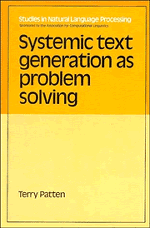Book contents
- Frontmatter
- Contents
- Dedication
- Preface
- 1 Introduction
- 2 Background I: AI problem solving
- 3 Background II: systemic grammar
- 4 The conflation
- 5 The formal model
- 6 The implementation
- 7 Related work in text generation
- 8 Conclusions
- Appendix A OPS5 tutorial
- Appendix B Sample texts
- Appendix C Excerpts from the grammar
- Notes
- Bibliography
- Index
- Frontmatter
- Contents
- Dedication
- Preface
- 1 Introduction
- 2 Background I: AI problem solving
- 3 Background II: systemic grammar
- 4 The conflation
- 5 The formal model
- 6 The implementation
- 7 Related work in text generation
- 8 Conclusions
- Appendix A OPS5 tutorial
- Appendix B Sample texts
- Appendix C Excerpts from the grammar
- Notes
- Bibliography
- Index
Summary
This book explores a new approach to text generation that interprets systemic grammar as a computational representation. Systemic grammars are interpreted as domain-specific knowledge and used by an artificial intelligence problem solver to solve text-generation problems. This is made possible by a fundamental, but hitherto unrecognized, relationship between systemic grammar and problem solving. This approach solves the methodological problem of interfacing specialized know ledge-based computational representations with equally specialized linguistic representations–because in this case the representation is the same. Previously, text-generation systems have had to make either linguistic sacrifices for computational reasons or computational sacrifices for linguistic reasons.
This approach to text generation has been investigated through two different channels. The primary means of investigation has been a substantial implementation involving a relatively large systemic grammar. The secondary means of investigation has been the construction of a formal model. Aside from a detailed discussion of the approach to text generation, the implementation, and the formal model, the topics covered in this book include the relevant background in artificial intelligence (AI) problem solving and systemic grammar, a comparison with other work in the field, and a sampling of ideas for future research.
The scientific context
Work in the area of natural-language processing has appeared under several banners, each of which has associated objectives and assumptions. It is therefore important to clarify the objectives and assumptions of the present work. Perhaps it would be best to begin by explicitly stating some of the fields of study to which no contribution has been intended.
- Type
- Chapter
- Information
- Systemic Text Generation as Problem Solving , pp. 1 - 5Publisher: Cambridge University PressPrint publication year: 1988



